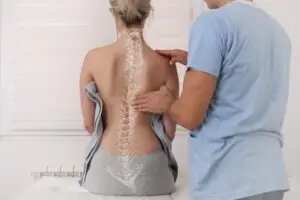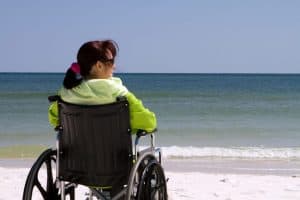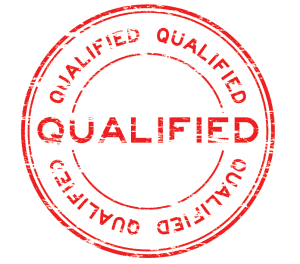
Get Disability Benefits With Scoliosis
Many people with scoliosis can continue to work and earn a living. Some people with severe cases of the back problem, however, suffer from impairments serious enough that they limit their ability to work. If your scoliosis is affecting your career and you need help making ends meet, you may be eligible for disability benefits, including Social Security Disability Insurance (SSDI) and Supplemental Security Income (SSI).
The disability lawyers at Berger and Green can determine which programs you qualify for and help you apply for them. We know what the Social Security Administration (SSA) looks for in a qualifying claim and can give you the best chance of approval the first time you apply. If they already denied your claim, we can navigate the appeals process for you and fight for the benefits you deserve. We have the experience you need to get Social Security Disability (SSD) for scoliosis in Pittsburgh. Call our office at 412-661-1400 for a complimentary consultation.
40+ years of experience from strong, knowledgeable, compassionate attorneys.
Start A Free EvaluationDoes My Scoliosis Diagnosis Qualify for Disability Benefits?
The SSA publishes a book of impairment listings, sometimes called the Blue Book. This list includes the criteria to qualify for SSD benefits based on a variety of medical conditions. While there is not a specific listing for scoliosis, you may qualify based on other listings. Most commonly, those with severe scoliosis meet qualifications under Section 1.04 – Disorders of the Spine.
To qualify under this listing, we need to provide proof that shows you suffer from:
- Nerve root compression causing pain, weakness, or mobility limitations;
- The need to change position very frequently because of inflammation around the spine; or
- A narrowing of the spine leading to issues with chronic pain, weakness, and limited mobility.
Because the effects of scoliosis vary so much from person to person, you might qualify under another impairment listing instead. Other than spinal disorders, areas that may apply to your include respiratory disorders or cardiovascular disorders.
We can help you determine if you meet the criteria outlined in the impairment listings. Even if you do not meet these qualifications, you may still qualify for SSD for your scoliosis based on your functional limitations.
We know you’re hurting. We can help. Free case evaluations, home and hospital visits.
Contact Us Now For HelpHow Can I Qualify for Disability Based on My Residual Functional Capacity?
If you do not meet the criteria in the impairment listings, you will need to rely on your residual functional capacity (RFC) to qualify for disability benefits. Your RFC is a statement of your abilities. Before issuing this statement, the SSA will review your medical documentation and sometimes schedule an independent medical examination to evaluate your limitations.
For most people with severe scoliosis, their physical limitations prevent them from working many active jobs. The disability examiner evaluating your claim will look for evidence that you cannot lift or carry objects or walk, stand, or sit for extended periods. They may also look for evidence of chronic pain, which causes difficulty working some jobs.
After they evaluate your limitations, the SSA will identify your abilities and issue your RFC. If they find you cannot work your previous job, any other previous job you qualify for, or a sedentary job, you may receive approval for disability benefits.
You need an attorney with the experience and dedication to give your case the care it deserves.
Start A Free EvaluationWhat Type of Medical Evidence Does the Examiner Look for in My SSD Claim?
When we file your disability benefit claim, we include contact information for all your doctors, specialists, and other practitioners who are familiar with your case. With this information, the SSA can request your medical records and other information to support the information provided in your application.
When it comes to proving your scoliosis is causing a serious impairment, they will consider documentation that includes:
- Records documenting your diagnosis;
- X-rays, MRIs, CT scans, and other medical imaging results;
- Physical examination results that outline your impairments; and
- Notes about physical therapy and other treatment procedures, their effectiveness, and any side effects you experienced.
We can address all the legal hurdles that may be keeping you from getting a fair settlement.
Speak To An Attorney TodayAre There Other Criteria I Need Meet to Get Disability Benefits?
The biggest hurdle for many people in getting the SSD benefits they need is meeting the medical qualifications. However, each disability benefit program also has other criteria.
For SSDI, you must have an earned income that falls below the current substantial gainful activity (SGA) limit. For 2017, that limit is $1,170 per month. This includes only income you earn from working a job or via self-employment. Investment income or other unearned sources do not count against you. You also need to have enough work credits based on your age and work history.
SSI is a need-based benefits program. This means you need to meet strict income and asset limits to qualify for this type of benefit. The 2017 monthly income limit for an individual is $735, while a couple can make up to $1,103 per month. This includes most types of income. In addition, you must have less than $2,000 in personal assets. Couples must have less than $3,000 worth of assets. There are some exceptions to this limit, including your home, vehicle, and tools used for work.
Our attorneys can help you better understand the income requirements for each disability program.
What If the SSA Already Denied My Disability Claim?
It is not unusual to receive a denial for an initial disability claim. This is especially true when your diagnosis is not in the impairment listings and you must qualify based on your RFC.
If you received a denial, we will represent you throughout the SSD appeals process by building a strong case for approval of your claim. We can apply for a time to go before the Administrative Law Judge and can usually get qualifying clients approved at this point in the process. If not, we will continue to fight for the benefits you deserve through the next steps in the appeals process if appropriate.
How Can I Talk to a Pittsburgh Disability Attorney About My Application?
Our legal team at Berger and Green is ready to go to work for you, getting you the disability for scoliosis you need to make ends meet. Let us evaluate your qualifications for benefits, prepare your claim, and help you file your application. Give us a call today at 412-661-1400 to schedule your complimentary consultation with an SSD lawyer.









